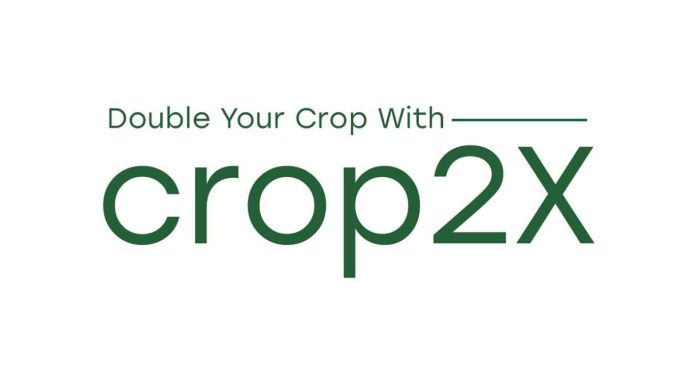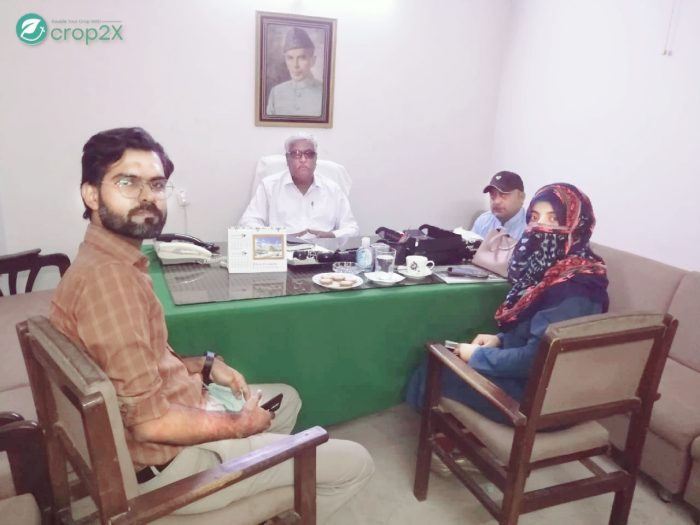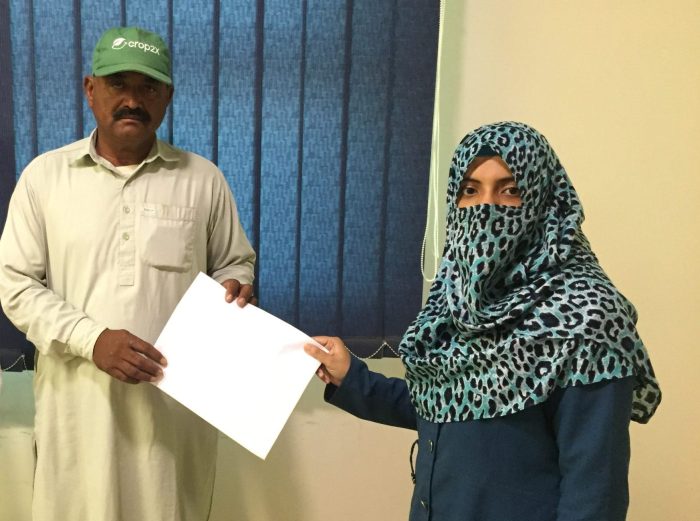Synergyzer: What is Crop2x, and How is it using technology and innovation to revolutionize the agriculture industry in Pakistan?
Crop2x is a young and ambitious startup that is working to revolutionize the agriculture industry in Pakistan. Our mission is to empower farmers with data-driven insights and recommendations. Which can help them make informed decisions about crop management, leading to increased crop yields and farmer incomes.
We are using a combination of satellite imagery, weather data, and soil data to analyze crop growth patterns, detect diseases, and predict yield. By collecting data on a regular basis and processing it using machine learning models, we are able to provide farmers with personalized recommendations that can help them optimize their use of resources such as fertilizer and water.
One of the key benefits of our technology is that it helps farmers to reduce their environmental impact by avoiding the overuse of inputs. This is important not only for the sustainability of the industry but also for the health and well-being of the local communities
We see ourselves as a catalyst for change in the agriculture industry in Pakistan. By providing farmers with the tools and insights they need to improve their crop yields and reduce their costs, we are helping to create a more sustainable and profitable agriculture industry in the country.
We are also working with large agribusinesses to provide them with data-driven insights on crop performance and market trends. This not only helps these businesses to optimize their operations but also contributes to the overall development of the industry by driving innovation and efficiency.
Overall, our goal is to make a positive impact on the lives of farmers and their communities, while also driving economic growth and development in Pakistan.
When it comes to traditional agricultural practices in Pakistan, the decision-making process for farmers is based largely on intuition and experience. Crop2x’s technology, on the other hand, provides farmers with personalized recommendations based on data analysis. This is achieved through the use of satellite imagery, weather data, and soil data to analyze crop growth patterns, detect diseases, and predict yield.
What really sets Crop2x apart from traditional practices is the concept of precision agriculture. By collecting data and processing it using machine learning models, Crop2x provides farmers with precise recommendations on the use of resources such as fertilizer, water, and pesticides. This helps to reduce waste and increase yields, making farming practices more efficient and sustainable.
Real-time monitoring is another significant advantage of Crop2x’s technology. By monitoring crop growth patterns and disease outbreaks in real time, farmers can take timely action to address problems and prevent crop losses. This is especially important in Pakistan, where unpredictable weather patterns and disease outbreaks are common.
Crop2x’s accessibility is also a key differentiator. Its mobile app and web-based platform make it easy for farmers to access data and recommendations from anywhere, at any time. This is particularly valuable in rural areas where farmers may have limited access to information and resources.
In summary, Crop2x’s technology and services offer a more data-driven, precise, and accessible approach to agriculture, which differs greatly from traditional practices in Pakistan. By leveraging technology to improve decision-making and reduce waste, Crop2x is helping to create a more sustainable and profitable agriculture industry in the country.
Synergyzer: How has winning the Shell Tameer Award impacted Crop2x, and what opportunities has it opened up for the company?
Winning the Shell Tameer Award was a significant milestone for our company. It gave us a great opportunity to showcase our technology and the impact we are making in the agriculture industry in Pakistan. The award provided us with valuable exposure to the local business community and opened up new networks for us to connect with potential customers, investors, and partners.
Winning the award gave us a boost in credibility and helped us to stand out in the competitive startup landscape. This has helped us to attract more customers and investors, and has opened up new opportunities for growth and expansion. We have also been able to connect with other startups and entrepreneurs through the Shell Tameer network, which has been incredibly valuable for sharing ideas and learning from others in the industry.
Synergyzer: How is Crop2x integrating AI into its operations to benefit farmers?
Crop2x’s AI algorithms are used to analyze satellite imagery and other data to predict crop yields, providing farmers with crucial information to make decisions about their operations.
By using image analysis, Crop2x’s AI algorithms can detect early signs of crop diseases, allowing farmers to take prompt action to prevent or mitigate crop losses. This early detection not only helps to save crops but also saves farmers money by reducing the need for costly interventions later on.
Crop2x’s AI algorithms also optimize irrigation scheduling by analyzing data on weather patterns, soil moisture levels, and other factors. This ensures that crops receive the right amount of water at the right time, which helps to conserve water and reduce costs. Additionally, AI algorithms can detect pest infestations early on, allowing farmers to take prompt action to control the pests before they cause significant damage to crops.
Crop2x also uses AI algorithms to analyze soil samples and provide farmers with recommendations on which crops to plant and what inputs to use to maximize yields. This personalized approach helps farmers make informed decisions and improve their yields and profitability.
By integrating AI into its operations, Crop2x is able to provide farmers with data-driven insights and recommendations that can help them make more informed decisions and improve their yields and profitability. Crop2x’s use of AI represents a significant departure from traditional agricultural practices in Pakistan, where farmers often rely on their intuition and experience to make decisions.
Crop2x clearly recognizes the importance of ensuring that its services are accessible to farmers across different regions and socioeconomic backgrounds. The company has implemented several strategies to achieve this goal and is constantly striving to expand its reach.
To begin with, Crop2x provides a mobile app that can be downloaded by farmers across Pakistan, including those in remote rural areas. This mobile app allows farmers to access data and recommendations on their smartphones from anywhere and at any time, making it an easily accessible tool for all farmers. Additionally, Crop2x offers a web-based platform that can be accessed from any device with an internet connection, which further expands the accessibility of its services.
Crop2x also understands that language barriers can be a significant challenge for farmers, particularly those in remote areas. To address this challenge, the company provides support in multiple languages, including Urdu, Sindhi, Punjabi, and English. This ensures that farmers who speak different languages can access and benefit from the company’s services.
Another critical aspect of accessibility is affordability, and Crop2x has taken measures to ensure that its services are priced at an affordable level, making them accessible to farmers across different socioeconomic backgrounds. The company offers flexible payment options, including both purchase and subscription plans, which further increase accessibility.
To reach farmers in underserved communities, Crop2x has partnered with local organizations, agribusinesses, and agritraders. These partnerships help to ensure that the company’s services are accessible to farmers who may not have access to other sources of information and resources.
Our goal has always been to make sure that all farmers in Pakistan have access to the information and resources they need to improve their yields and profitability. We understand that accessibility is critical, particularly for farmers in remote and underserved areas, and we are constantly working to expand our reach and ensure that our services are accessible to all.
Our commitment to accessibility has helped to ensure that its services are accessible to farmers across different regions and socioeconomic backgrounds in Pakistan. By providing data-driven insights and recommendations, the company is helping to create a more sustainable and profitable agriculture industry for all farmers in the country.
One way AI is being used is to analyze historical data on weather patterns, soil moisture, and other factors to predict crop yields. This information can help farmers make data-driven decisions on how much seed, fertilizer, and other inputs to use, which can increase yields and reduce costs.
Another example is using AI algorithms to analyze images of crops to detect signs of diseases, such as discoloration or wilting. Detecting diseases early can help farmers take prompt action to prevent further spread and reduce crop losses.
AI algorithms can also analyze data from sensors placed throughout a field to optimize the use of resources such as water and fertilizer. By applying inputs only where they are needed, farmers can reduce waste and increase yields.
Additionally, AI algorithms can analyze images of crops to detect signs of pest infestations, which helps farmers take prompt action to control the pests before they cause significant damage to crops.
Lastly, AI algorithms can analyze soil samples to provide recommendations on which crops to plant and what inputs to use to maximize yields. By using this information, farmers can make data-driven decisions on how to manage their fields, which can increase yields and reduce costs.
As AI continues to develop and become more sophisticated, we’ll see even more innovative applications in the future. For example, AI could be used to create autonomous farming equipment that can operate on its own or to monitor crop growth patterns and make recommendations in real-time. The possibilities are endless.
We collect various types of data from farmers, starting with soil samples from their fields. We analyze these samples to determine nutrient levels, pH, and other factors that can affect crop growth. Additionally, we collect weather data from different sources to track rainfall, temperature, and other factors that can affect crop growth.
We also collect data on the types of crops farmers are planting, as well as the planting dates and harvesting dates for each crop. We also collect data on pest and disease outbreaks in farmers’ fields, including the types of pests or diseases, the severity of the outbreak, and any treatments that were applied. Finally, we collect data on farmers’ use of inputs such as fertilizer and water, as well as any other management practices they employ, such as crop rotation or cover cropping.
By collecting this data, we can provide farmers with customized recommendations on how to manage their fields more effectively. For example, if the soil analysis shows that a field is deficient in nitrogen, we may recommend applying a specific type and amount of fertilizer to improve nutrient levels. Similarly, if weather data shows that a period of drought is expected, we may recommend adjusting irrigation schedules to conserve water.
In addition to providing recommendations to individual farmers, we also use the data we collect to identify broader trends and patterns in agricultural practices. This information can be used to inform research and development efforts, as well as policy decisions related to agriculture in Pakistan.
Crop2x recognizes that trust and transparency are essential when collecting data from farmers. We take several steps to ensure that farmers understand the importance of sharing relevant data and that the data collection process is transparent and equitable.
Firstly, we work with farmers to educate them on the importance of data sharing and how their data is being used to improve agricultural practices. We provide training on data privacy and security to ensure that farmers understand how their data is being protected.
We offer incentives to farmers who share data, such as access to personalized recommendations and discounts on inputs. This encourages farmers to share data and helps to build trust in the data collection process.
We recognize that farmers own the data generated on their fields, and we work to ensure that they have control over how their data is used. We obtain farmers’ consent before collecting any data and allow them to opt out of data collection at any time. We’re transparent about how we collect and use data and provide farmers with clear explanations of our data policies. Additionally, we allow farmers to access their data and see how it is being used.
We’re committed to ensuring that the benefits of data-driven agriculture are accessible to all farmers, regardless of their socioeconomic status. We provide our services at an affordable price point and work with local organizations to reach farmers in underserved communities.
We take a proactive approach to building trust and transparency with farmers, which helps to ensure that the data collection process is equitable and beneficial for all parties involved.
Synergyzer: How does Crop2x ensure that the AI models used in agriculture are accurate and reliable?
Certainly. Crop2x takes several steps to ensure the accuracy and reliability of its AI models.
Firstly, we make sure that the data used to train our AI models is of high quality and free from errors or biases. We also validate our AI models by comparing their predictions with real-world data to confirm their accuracy. Additionally, we collaborate with agricultural experts and test our models in the field to ensure that they are based on sound scientific principles and effective in real-world conditions. Lastly, we regularly update our models to account for changes in agricultural practices and environmental conditions. All of these steps help to ensure that our AI models are accurate and reliable, allowing farmers to receive high-quality recommendations and make informed decisions to improve their agricultural practices.
As a startup in the agriculture industry, it’s important to understand that farmers are your primary customers, and their needs should be the driving force behind your AI solutions. This requires conducting market research and speaking with farmers to identify their needs and how AI can assist them. It’s also important to design your AI solutions with the end-user in mind and ensure that they are easy to use and provide clear value to farmers.
The quality of the data used to train AI models is crucial to their accuracy and reliability. Collecting high-quality data and implementing measures to ensure its quality, such as data cleaning, filtering, and validation, is crucial. Also, it’s essential to ensure that farmers understand the data collection process and are comfortable sharing their data.
In agriculture, it’s vital to collaborate with experts, such as agronomists, soil scientists, and other professionals, to ensure that your AI solutions are based on sound scientific principles and best practices in the field. Experts can also help you identify new opportunities and challenges in the industry.
Data privacy and security are critical concerns in agriculture, and building trust with farmers by being transparent about how their data is collected, used, and protected is crucial. It’s important to ensure that farmers have control over their data and understand how it’s being used to benefit them.
Lastly, AI solutions are never perfect, and continuous improvement is essential. It’s necessary to iterate and improve your AI models based on feedback from farmers and performance metrics. Continuously updating and enhancing your AI models will ensure that they remain accurate and relevant to farmers’ needs.
In summary, startups looking to integrate AI into agriculture operations should focus on understanding farmers’ needs, ensuring data quality, collaborating with experts, building trust with farmers, and continuously improving their AI solutions based on feedback and performance metrics. By following these principles, startups can develop effective AI solutions that benefit farmers and improve agricultural practices.
Synergyzer: Can you talk about any future plans or projects that Crop2x has in the works related to AI and agriculture?
The company has made it clear that it is committed to continuing to leverage AI and other advanced technologies to improve agricultural practices and support farmers.
As climate change continues to have a significant impact on agricultural practices. Crop2x may look to develop AI-powered solutions that help farmers adapt to changing weather patterns, reduce greenhouse gas emissions, and improve soil health.
Crop2x may look to expand its use of AI to support precision agriculture, which involves using data and technology to optimize crop yields and minimize waste. This could include using AI-powered drones to monitor crop health and applying precision irrigation and fertilization techniques.
Crop2x may explore using AI to optimize the agricultural supply chain, from planting to harvesting to distribution. This could involve using predictive analytics to optimize logistics and reduce waste, as well as using blockchain technology to improve transparency and traceability in the supply chain.
With its proven track record of success in Pakistan, Crop2x may look to expand its operations into new markets in the future. This could involve leveraging AI to tailor its services to the specific needs and challenges of different regions and crops.
Crop2x is likely to continue to be at the forefront of innovation in the agriculture industry, leveraging AI and other advanced technologies to improve the livelihoods of farmers and promote sustainable agriculture practices.
Synergyzer: How has Crop2x leveraged AI to optimize its marketing and outreach strategies, and what measurable benefits has the company seen as a result?
Certainly! Crop2x plans to leverage AI to optimize its marketing and outreach strategies in several ways. Firstly, the company plans to use AI-powered chatbots to interact with potential and current clients, providing personalized recommendations and answering frequently asked questions. This will help to streamline the customer experience and ensure that clients receive the information they need quickly and efficiently.
Secondly, Crop2x plans to use AI-powered analytics to gain insights into customer behavior and preferences. By analyzing data from social media, website visits, and other sources, the company can better understand its customers’ needs and tailor its marketing messages accordingly. This could include creating targeted advertising campaigns or developing customized content based on customer interests.
Thirdly, Crop2x plans to use AI to optimize its email marketing campaigns. By analyzing customer data and behavior, the company can personalize email content and delivery times to increase engagement and conversion rates.
By leveraging AI in its marketing and outreach strategies, Crop2x aims to increase customer engagement, improve conversion rates, and ultimately grow its business.




